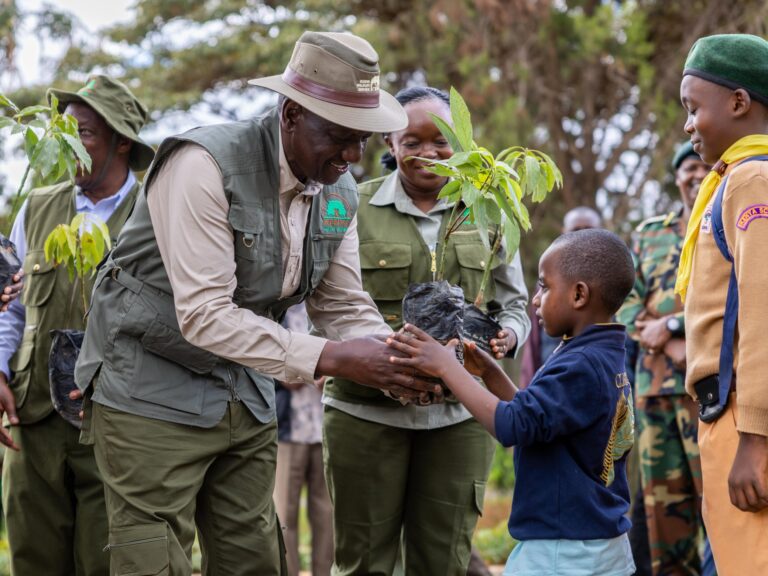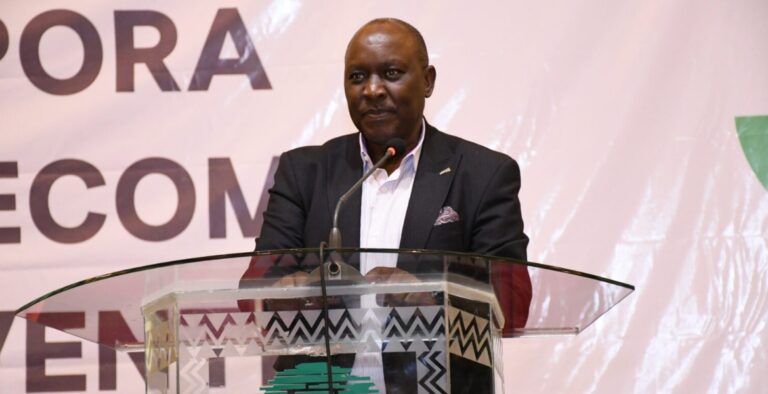
A Cocoa farmer in Ghana holding fresh Cocoa from her farm before she prepares them for export. (Photo/Courtesy).
By Daisy Okiring
Nairobi, Kenya — August 21, 2025
How can a continent that produces the bulk of the world’s cocoa, feeds Europe with coffee and tea, and supplies Asia with cashews and sesame, still have 278 million of its people go hungry every day?
The paradox is as bitter as it is undeniable. Africa, home to 60 percent of the world’s uncultivated arable land, should be an agricultural superpower. Its fertile soils stretch from the savannas of Nigeria to the highlands of Ethiopia, feeding global markets with cash crops. Yet, across the continent, children sleep on empty stomachs, mothers skip meals, and small farmers struggle to afford the very food they grow.
The Food and Agriculture Organization (FAO) reports that in 2022, one in five Africans—over 278 million people—suffered from hunger, even as the continent exported billions of dollars’ worth of agricultural commodities. The irony deepens when you consider that sub-Saharan Africa alone has the potential to increase cereal and grain production threefold with proper investment.
As Dr. Akinwumi Adesina, President of the African Development Bank, lamented: “It is a tragic irony that Africa, which has the potential to feed the world, cannot feed itself.”
Newsflash, through comprehensive research, uncovers that Africa’s hunger crisis is not about the inability to produce food—it is about structural inequalities, colonial legacies, climate pressures, and governance failures that continue to undermine food sovereignty.
Africa’s agricultural abundance versus hunger
Africa is not food-poor; it is food-rich. The continent’s vast agricultural landscapes make it one of the world’s primary suppliers of raw commodities. Ghana and Côte d’Ivoire alone produce over 75 percent of global cocoa, while Ethiopia’s highlands remain the beating heart of the world’s coffee culture. Kenya’s tea exports dominate international markets, and Nigeria is one of the largest cassava producers globally.
Yet, in the same Ghana where cocoa is king, over 1.2 million children are malnourished. In Ethiopia, the birthplace of coffee, 20 million people depend on food aid due to recurring droughts.
The contradiction is striking: while African farms and plantations sustain supermarkets in Paris, London, and Beijing, African families face skyrocketing food prices and limited access to nutritious meals. The World Bank estimates that nearly 40 percent of Africa’s population lives in poverty, which means that even when food is available in markets, it remains inaccessible to millions.
Read More: How Europe’s 2040 climate target could redefine the global carbon economy
A United Nations World Food Programme (WFP) 2023 study showed that food inflation in Africa averaged 23 percent—twice the global average—leaving millions unable to afford staples like maize meal, rice, and cooking oil.
Former Nigerian President Olusegun Obasanjo underscored this paradox: “We cannot continue exporting what we do not eat, and importing what we should grow.”

The export economy and food insecurity
Africa’s hunger paradox is deeply tied to its export-driven economy. Crops that could be used to strengthen local food security are prioritized for international markets. Cocoa from Côte d’Ivoire, avocados from Kenya, and flowers from Ethiopia bring in foreign exchange but often leave local people priced out of their own produce.
In Côte d’Ivoire, farmers earn less than $1.20 a day from cocoa, even as their harvest fuels a multi-billion-dollar chocolate industry abroad. In Kenya, avocados and French beans are shipped to Europe while Nairobi’s urban poor face spiraling food costs.
The United Nations Conference on Trade and Development (UNCTAD) revealed that in 2023, Africa imported $75 billion worth of food, including wheat, rice, and dairy products. This dependency is shocking for a continent so agriculturally endowed. Wheat imports alone make up nearly 90 percent of what Africa consumes, with countries like Egypt, Nigeria, and Sudan heavily dependent on shipments from Russia and Ukraine. The war in Ukraine disrupted this lifeline, exposing just how fragile Africa’s food systems are.
Read More: A nation eating itself: How Kenya’s poor are being left to die hungry
As Obasanjo pointed out, the continent is locked into colonial trade structures where raw goods are exported and processed foods are imported at much higher prices. The result is not only economic imbalance but persistent hunger.

Climate change and the hunger trap
The hunger paradox is further compounded by climate change. The Horn of Africa is experiencing the worst drought in 40 years, with over 36 million people at risk of starvation according to the UN Office for the Coordination of Humanitarian Affairs (OCHA). At the same time, floods in Nigeria and South Sudan have displaced millions and destroyed farmlands.
Smallholder farmers, who produce 80 percent of Africa’s food, are most affected. Crops wither, livestock die, and entire communities are forced into displacement. In the Sahel, desertification advances rapidly, while rising sea levels threaten rice fields in coastal West Africa.
António Guterres, UN Secretary-General, captured the urgency: “Climate change is not a distant threat. It is already killing crops, killing livestock, and killing people.”
The Intergovernmental Panel on Climate Change (IPCC) projects that African crop yields could decline by 20 percent by 2050 if adaptation is not prioritized. Meanwhile, the World Meteorological Organization warns that rising temperatures are already reducing maize production in Southern Africa by 10–15 percent.
Africa contributes less than 4 percent of global greenhouse gas emissions, yet it bears the brunt of climate-induced hunger. Without large-scale adaptation, the continent risks deeper cycles of famine.

Governance, policy failures and food dependency
Beyond climate, governance failures play a critical role in Africa’s food insecurity. Many countries remain dependent on food imports despite vast agricultural potential. Nigeria, with over 34 million hectares of arable land, continues to import rice on a massive scale.
According to the African Union, governments across the continent spend about $35 billion annually on food imports. That is money that could be invested in irrigation, silos, modern storage, and infrastructure to reduce post-harvest losses, which claim up to 40 percent of Africa’s annual food production.
Macky Sall, former Chairperson of the African Union, once declared: “We must invest in Africa’s food sovereignty, not food dependency.” Yet corruption, weak institutions, and political instability continue to undermine agricultural reform. In some countries, subsidies are diverted, agricultural extension services are neglected, and farmers are left without access to credit or technology.
Read More: Africa unites to demand bold plastics treaty action
In addition, poor transport infrastructure makes it difficult for farmers to move produce from rural areas to urban markets. Roads in many parts of Africa remain unpaved, and storage facilities are inadequate. A farmer in Uganda may grow enough bananas for both local consumption and export, but without refrigerated trucks or warehouses, half the harvest rots before reaching markets.

The human face of hunger
Beyond statistics, hunger in Africa has a deeply human face. In Malawi, smallholder maize farmers often sell their harvest at low prices during the season, only to buy it back at three times the price during the lean months. In Kenya’s Turkana region, pastoralists walk miles searching for pasture and water, often losing entire herds to drought.
Women and children suffer the most. Women produce up to 70 percent of Africa’s food, yet they remain the most food insecure due to gender inequality, limited access to credit, and exclusion from land ownership. The African Development Bank notes that women farmers receive only 10 percent of available credit and 5 percent of agricultural extension services, despite being the backbone of food systems.
Graça Machel, renowned humanitarian, once said: “Hunger is not only about empty stomachs. It is about dignity, justice, and equity.” Her words resonate in communities where children are stunted from malnutrition and mothers must make heartbreaking choices between feeding themselves or their children.

Pathways to ending the paradox
Solutions exist, but they require political courage and global solidarity. First, African nations must shift away from over-reliance on export crops and strengthen local food value chains. Processing industries must be built within Africa, creating jobs and ensuring that raw commodities are not shipped abroad while the continent imports processed goods at inflated prices.
Second, investment in climate-smart agriculture is essential—irrigation systems, drought-resistant seeds, and early warning systems for farmers. Third, infrastructure must be modernized to reduce the enormous post-harvest losses that contribute to food shortages.
Fourth, empowering women and youth is critical. With access to land, credit, and technology, Africa’s farmers could become engines of food sovereignty. Finally, regional trade integration through the African Continental Free Trade Area (AfCFTA) can reduce dependence on imports from outside the continent.
The late Kofi Annan once said: “Africa can and must feed itself within a generation.” That vision requires both domestic policy change and international fairness, including climate finance and equitable trade agreements.

What Next?
The hunger paradox is Africa’s most pressing moral and political dilemma. A continent blessed with fertile soils, abundant resources, and hardworking farmers should never be synonymous with famine. Yet, due to global inequalities, export dependency, climate change, and governance failures, millions of Africans face food insecurity daily.
Newsflash through comprehensive research uncovers that hunger in Africa is not inevitable—it is man-made. It is the result of choices about trade, governance, and global justice.
As the world looks to Africa to supply the crops, minerals, and resources of the future, the question remains: will Africa continue to feed others while starving itself? Or will it seize the moment to reclaim sovereignty over its food systems?
The answer must be urgent and decisive. For in truth, Africa does not lack food. It lacks fairness.



